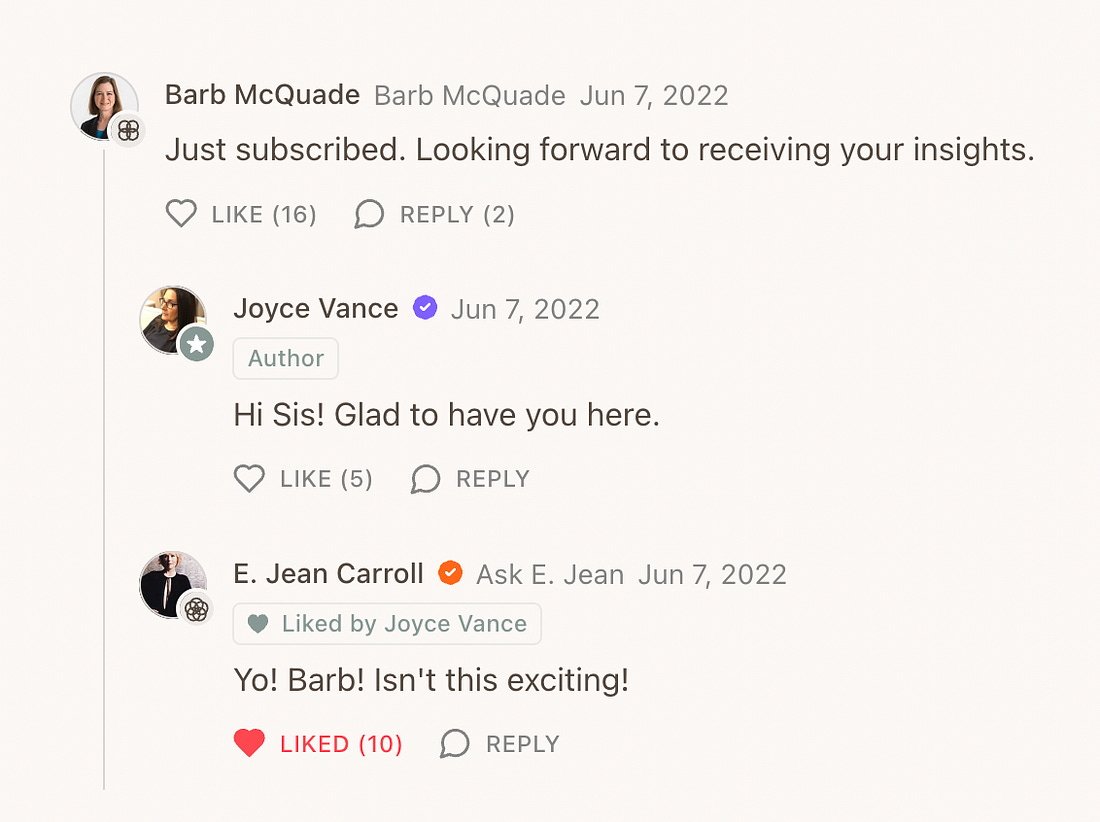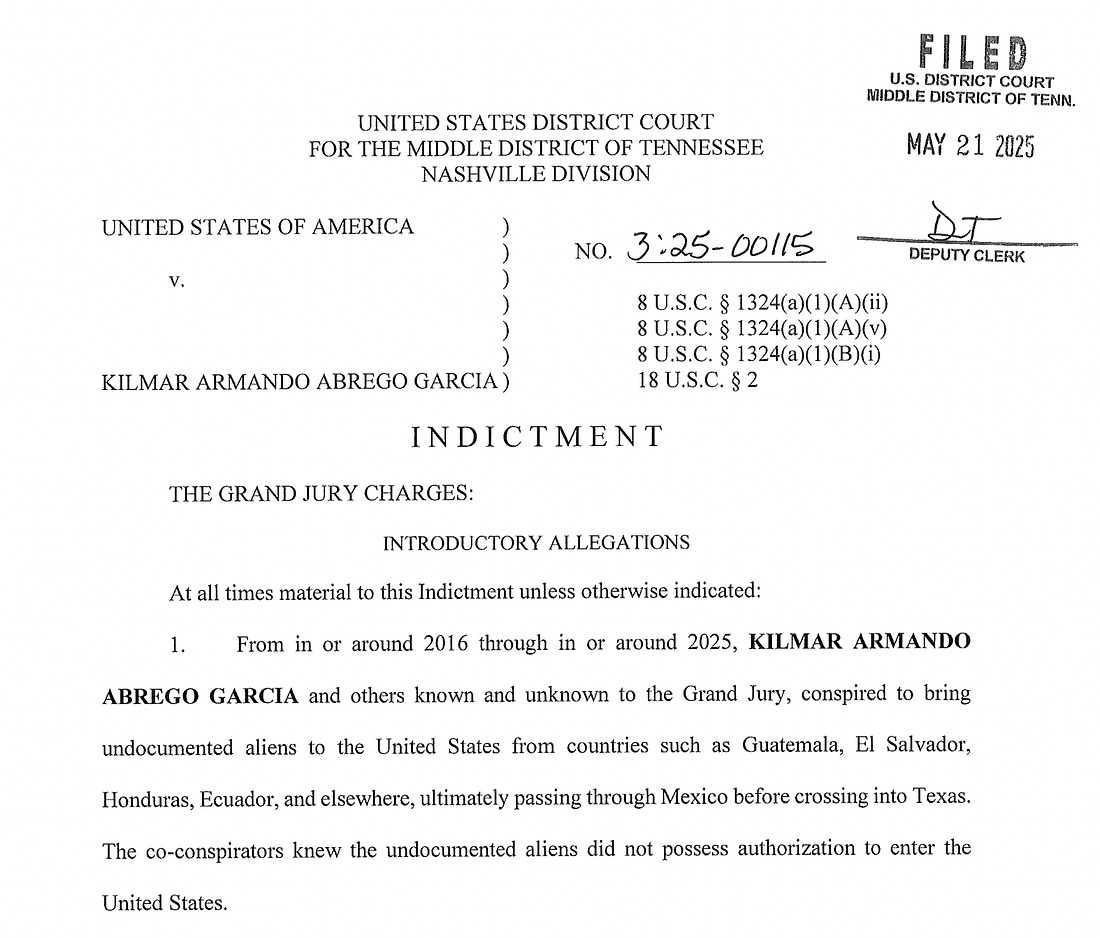|
 |
The first newsletter I sent out had the subject line “Civil Discourse Making a start — June 7, 2022.” Is it possible that was only three years ago? In so many ways, it seems like an entirely different, hopelessly naive era. But despite the challenges, we are making our way and learning that the fight to save a democracy takes time and that our progress isn’t always a straight line forward. I remain optimistic that we are going to get there, but there is a lot of work ahead.
We do, however, have the most important tools we need for the job. I looked back at the comments to that first post and saw this. The ultimate weapon we have is our support for each other.
Since then, we’ve discussed and analyzed some of what will undoubtedly be viewed from the other side as one of the most critical eras of American history together. And of course, it doesn’t stop.
Yesterday afternoon, the Justice Department, after weeks of saying it couldn’t return El Salvadoran Kilmar Abrego Garcia to the United States, announced it was doing exactly that. The government has backed down from its confrontation with the Supreme Court, at least in this instance. But the Justice Department also indicted Abrego Garcia on charges related to human trafficking in the Middle District of Tennessee. Attorney General Pam Bondi made public statements demonizing him and going far beyond the four corners of the indictment in claiming he engaged in major criminal conduct, which violates clear DOJ policy. It’s unlikely she will face any consequences under this administration.
But the criminal chief in the U.S. Attorney’s office in Nashville, a career employee for more than a decade, quietly resigned. ABC is reporting his resignation happened because he disagreed with the decision to indict the case.
Judge Waverly Crenshaw, a 2016 Obama appointee, drew the case. He was unanimously confirmed by the Senate in 2016, near the end of the Obama presidency, at a point in time where Senate Republicans were actively refusing to confirm highly qualified nominees—including a fellow Tennessean— to the bench in the Deep South. It is unlikely he will continue to receive that support. We will see how the government’s evidence holds up and whether inevitable legal challenges to vindictive prosecution have merit. Judge Crenshaw recently handled the public corruption prosecution of Tennessee state Senator Brian Kelsey, who pled guilty to a campaign finance conspiracy and had just begun to serve his sentence before he was pardoned by Donald Trump in March.
Also Friday afternoon, the Supreme Court gave DOGE a pair of wins. First, in the Social Security case. In a ruling off of the shadow docket, DOGE was awarded unfettered access to our personal data at the Social Security Administration (SSA) while litigation to determine its legality proceeds. The District Court had denied DOGE access for now, entering a preliminary injunction and maintaining the status quo while the case moved forward. That decision was affirmed by the Fourth Circuit, sitting en banc on a 9-6 vote denying the government’s request for a stay (an order rejecting the lower court’s preliminary injunction). The government took its request for access to Americans’ records to the Supreme Court in an emergency appeal.
Justices Kagan, Sotomayor, and Jackson would have denied that request. But the conservative majority, referencing the four factors used to decide preliminary injunctions, seems to have ruled (in shadow docket case, we get no opinion from the majority explaining their decision) that the government is entitled to a stay because it made a strong showing it was likely to succeed on the merits, would be irreparably injured if it couldn’t proceed, and the public interested merited giving DOGE access. No wonder the Court wanted to deal with this off of the shadow docket—imagine writing the opinion justifying that. It’s nuts. This is the sort of thing that gives the shadow docket its bad name, even though the Court needs a docket for handling emergency matters.
Justice Ketanji Brown Jackson wrote a 10-page dissent that said the Court’s decision would lead to “grave privacy risks for millions of Americans.” She argued that risk wasn’t justified, “But, today, the Court grants a stay permitting the Government to give unfettered data access to DOGE regardless—despite its failure to show any need or any interest in complying with existing privacy safeguards, and all before we know for sure whether federal law countenances such access.” The Solicitor General’s Office argued in its brief that “Employees charged with modernizing government information systems and routing [sic] out fraud, waste, and abuse in data systems plainly need access to those systems.”
In the second case, SCOTUS granted the Trump administration's request to stop, for now, discovery that both the district court and the court of appeals had ruled could proceed in a case brought by Citizens for Responsibility and Ethics in Washington (CREW) to challenge DOGE’s legitimacy. The six justices in the conservative majority issued a miscellaneous order that returned the case to the court of appeals for because it wasn’t “appropriately tailored.” In other words, they didn’t believe CREW was entitled to elicit as much information about DOGE’s internal operations and leadership as the lower courts had allowed. Nothing like keeping the truth from the public, especially where DOGE is concerned.
The majority cited case law that holds “[S]pecial considerations control when the Executive Branch’s interests in maintaining the autonomy of its office and safeguarding the confidentiality of its communications are implicated.” So much for those unanimous decisions we saw from the Court earlier this week. When it comes to the most important issue the country faces—whether the president is a king or not—the pro-Trump majority still seems to hold.
Our backdrop for understanding these recent decisions, more steps on Trump’s path towards accreting power, is the three remarkable Substack Live interviews in The Autocracy and Democracy series I’ve been fortunate enough to share with you this week. If you’ve missed them, you can still watch. The expertise these women bring to the table is pretty incredible:
Our fourth get-together in the series takes place Sunday with Ruth Ben-Ghiat, the author of Strongmen, at 5 p.m. ET.
I want to thank my four friends, Stacey, Dahlia, Kim, and Ruth from the bottom of my heart for giving so graciously of their time and sharing their knowledge with us so that we can all be better informed and better reasoned. In my mind, it’s this kind of community that is our greatest strength. I hope you follow their work and that you’ve benefited from the opportunity to hear from them in-depth.
In the next couple of weeks, I’ll be finishing up my first book, Giving Up Is Unforgivable—A Manual for Keeping a Democracy. It’s what’s called a “crash book”—one that’s written in a matter of months as events are unfolding. My inner nerd could have spent months just reading old court cases and going down historical rabbit holes, and I’ve done plenty of that, but I’ve tried to be sensible about getting this book to you while it’s needed.
One fun option: you can preorder a signed copy of Giving Up is Unforgivable at my amazing local



